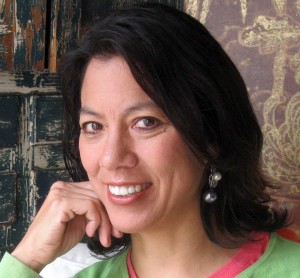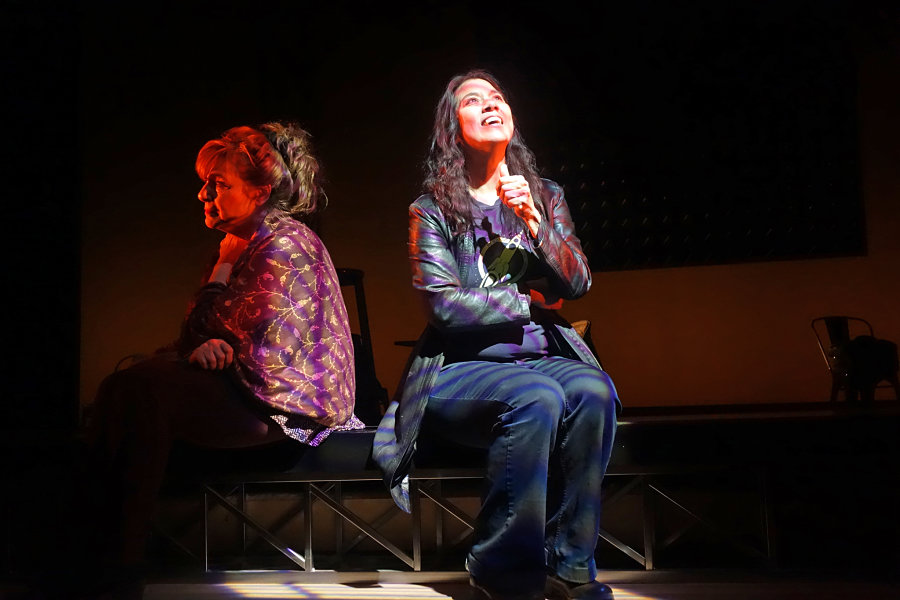The polymath Sandra Tsing Loh has been her own richest subject for most of her career, which encompasses several nonfiction books and solo plays about her bicultural family (Aliens in America), anxiety (I Worry), child-rearing (Mother on Fire), and the vagaries of life in Southern California (Depth Becomes Her, A Year in Van Nuys). This month she debuts The Madwoman in the Volvo, a new play based on her book about menopause, infidelity, and midlife crisis, at South Coast Repertory in Costa Mesa., Calif., Jan. 3–25.
How did Madwoman get turned from a book into a play?
I went to the Sundance Theatre Lab about two years ago to work on a quote-unquote “new piece.” I had not written a new solo play since Mother On Fire in 2008. After doing five or six one-woman shows in all different styles and themes, even a Christmas show, why would I scramble onstage again and tell another story? I realized: because midlife breakups are the stuff of life. And the older you get the more life you have.
My first intention was to write an affable midlife show like Menopause, the Musical or Love, Loss and What I Wore—something for four or five actors who can do that choral thing, and I can just go home and collect my royalty check. But my director, Lisa Peterson, and my dramaturg, Janice Paran, told me those shows don’t work anymore; I would have to make an actual theatre piece. They pushed me to go really deep into the whole story. It went beyond humor; it’s still funny, but it goes deep into those moments.
Janice asked me, for instance, “When you have an affair, how do you tell your husband?” No one had asked me that question, and I had to think about that. It became a central moment in the show. And that kind of made it exciting and interesting again.
What solo performers have inspired you?
I’m a fan of all of them: Spalding Gray, John Leguizamo, Charlayne Woodard, Josh Kornbluth, Julia Sweeney, Lisa Kron’s 2.5 Minute Ride, Eddie Izzard. There’s no solo player I haven’t watched and studied. And I’m actually teaching a course at UC Irvine about translating personal experience into theatre.
But Madwoman isn’t a solo play.
It isn’t, and that evolved in an interesting, organic way. At Sundance the same time I was there, Michael John LaChiusa was working on his First Daughter Suite, and there was the most amazing collection of Broadway actresses around. Sundance’s Philip Himberg said, “You could write this as a solo play, or you have a unique opportunity: You could have Kathy Chalfant or Mary Testa read with you.” I so love the idea of creating roles for women in midlife and older. So what if I had two gals at my side? We added my mother and my sister as characters, and Caroline Aaron and Shannon Holt are playing them at South Coast. First they come in as my mother and my sister, but sometimes we’re all at a drunk party together; they play men, boys, even Germaine Greer.

So you didn’t just turn your book into a play?
I so wish I could have done that! No, I had to write enormous amounts of new material, and a bunch of new stuff that was really personal and serious. The emotional tonality is different than the book. But in the end, it’s all really about the joy of women being together. We talk a lot about diversity in the theatre, but I think middle-aged women are unsung and uncelebrated. Most people who go to the theatre are women over a certain age; this feels like I’m just talking to my people.
Since you’re in L.A., I have to ask: Anything brewing on the film/TV front?
Those ideas are always circling. In L.A., if you write one thing, it’s supposed turn into 12 other things.
I guess I just always thought someone would have put you in a series by now.
I’ve had many fans and nibbles over the years. One story I love to tell is that my agent got a call for me to go see the Disney movie casting people, and as I walked down the hall, all these people were popping their heads out of their offices, like, “Oh, she’s here!” And the casting person met with me and said, “I’m so glad you’re here. There has never been a role in a film that has even been remotely right for you, but I just wanted to meet you and tell you what a big fan I am.”
Of course, your stuff does take many forms: articles, books, radio, theatre. Just not film and TV.
It’s interesting: Over the summer, at Broad Stage in L.A., I did this cabaret piece called The Bitch Is Back. I had been on tour with my book of Madwoman, and instead having me do readings, women started throwing house parties where they’d have wine and talk about the book. I evolved a standup routine for them to talk about this book; it was about menopause and obsessively weighing oneself and having breakdowns at Trader Joe’s because there’s no parking. So I did a version of that at the Broad in their cabaret space; I even served wine while talking. It was complete gladiatoral cabaret. It went great. And I realized: That’s what I take from my years of solo performance. I never had the $10 million, but I am this mid-career person and I’ve gotten really good at this; this is a craft that I know very well at this point.
Most of your shows have been scripted, though. How did you develop a facility for crowd work?
When I did I Worry, in the third section, I would go, “This isn’t working,” and I’d have them bring up the house lights. I’d come out into the audience and look for the man who was dragged along by his wife and didn’t want to be there, and I’d tear up his program, say, “Don’t look at your program, be in the moment!” At Woolly Mammoth, I found a guy who was frantically writing; I took his notebook and threw it across the room. He was a critic, and he gave me a terrible review. When I did it at Actors Theatre of Louisville, I went up to a guy and grabbed his program and said, “Be in the moment!” And he said, “Get your hands off me or I’ll fucking kill you.” These are the things you learn along the way.
I’ve heard the conventional wisdom that life gets better with age. I’m not sure I buy it. Do you?
I would say it does. For women, it can be rough—there’s kind of a perfect storm where their hormones are out of whack and they don’t know which way is up. But I remember when I turned 24, I said to myself, “This is the last year I can be considered a wunderkind.” For young people, the clock is ticking louder in some ways than for older people. When I was 34, an agent told me, “You’ve gotta say you’re 31; no one’s buying scripts from anyone in their mid-30s.” And when I turned 36, I was told, “Don’t tell anyone you’re 36.” So I went on the radio and did a show where I said over and over and over, “I’m 36.” I actually didn’t get my SAG card until I was 42. I’m living my life backwards.


